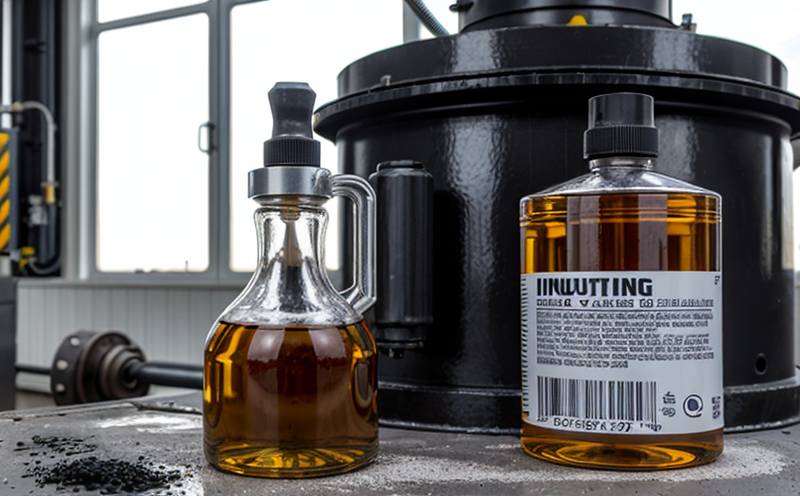IEC 60590 Lubricant Additive Electrical Safety Testing
The International Electrotechnical Commission's standard IEC 60590 is specifically designed to ensure the electrical safety and performance of lubricant additives used in electric machinery. This testing service focuses on verifying that these additives meet stringent international standards, ensuring they do not compromise the safe operation of electrical components.
The process involves a series of rigorous tests aimed at assessing the additive's compatibility with electronic systems, its potential to cause short circuits or other electrical hazards, and its overall impact on equipment reliability. This service is crucial for quality managers and compliance officers looking to ensure that their lubricant additives meet not only regulatory requirements but also the highest standards of safety and performance.
The testing procedure begins with a detailed review of the additive's chemical composition and intended use within electric machinery. Specimen preparation typically involves mixing the additive in accordance with specific ratios and then subjecting it to a series of tests that simulate real-world operating conditions. The primary apparatus used includes high-voltage testers, insulation resistance meters, and specialized test rigs designed to mimic electrical stress.
The acceptance criteria for IEC 60590 testing are based on international standards and guidelines, ensuring consistency across different jurisdictions. These criteria include the additive's ability to withstand specified voltage levels without causing arcs or shorts, its impact on dielectric strength, and its compatibility with various metals and plastics used in electrical components.
Through this testing, we provide a comprehensive analysis of the additive’s performance under extreme conditions that may be encountered during use. This ensures that the lubricant additives not only enhance mechanical properties but also maintain or improve electrical insulation characteristics, thereby contributing to longer operational lifetimes and safer machinery operation.
Quality and Reliability Assurance
The quality assurance process in IEC 60590 testing is critical for ensuring that lubricant additives meet the highest standards of safety and performance. This service focuses on several key areas to guarantee reliability:
- Compliance with Standards: Our tests adhere strictly to international standards such as IEC 60590, ASTM D7248, and EN 50160.
- Consistent Testing Procedures: Rigorous protocols are followed for each test, ensuring consistency and accuracy across all samples.
- Advanced Instrumentation: Utilizing state-of-the-art equipment to measure electrical parameters with precision.
The reliability of the results is further enhanced by our adherence to strict quality control measures. This includes regular calibration of instruments, training of personnel, and ongoing validation of test procedures. Our commitment to accuracy ensures that you receive reliable data that can be used confidently in decision-making processes.
Our team of experts works closely with clients to understand their specific requirements and tailor the testing process accordingly. By focusing on both technical expertise and client needs, we provide a comprehensive service that not only meets but exceeds industry expectations for electrical safety.
Customer Impact and Satisfaction
- Enhanced Safety: By ensuring compliance with IEC 60590 standards, our testing helps prevent potential hazards associated with improper lubricant additives.
- Improved Product Quality: Our rigorous testing process guarantees that only the highest quality additives pass through to market, enhancing overall product reliability.
The positive impact of this service extends beyond just compliance; it contributes significantly to customer satisfaction by delivering reliable and safe products. This is achieved through meticulous attention to detail throughout every stage of the testing process.
Our clients benefit from increased trust in their brand due to the consistent quality and safety standards that are upheld. By partnering with us, they can be assured that their lubricant additives meet or exceed international safety regulations, thereby reducing risks associated with non-compliant products.
Use Cases and Application Examples
| Application Example | Description |
|---|---|
| Data Center Cooling Systems | Lubricant additives that improve the performance of bearings in data center cooling systems are tested to ensure they do not pose electrical hazards. |
| Wind Turbine Generators | Additives used in the lubrication of wind turbine gears and shafts must be electrically safe, especially during high-speed operation. |
| Electric Vehicles (EV) | The lubricants in the transmission systems of EVs need to be tested for their electrical properties to ensure they do not interfere with the vehicle's electronics. |
- Data Center Cooling Systems: Lubricant additives that improve the performance of bearings are tested to ensure they do not pose electrical hazards.
- Wind Turbine Generators: Additives used in the lubrication of gears and shafts must be electrically safe, especially during high-speed operation.
- Electric Vehicles (EV): The lubricants in the transmission systems need to be tested for their electrical properties to ensure they do not interfere with the vehicle's electronics.
The successful application of these tests ensures that lubricant additives are both effective and safe, contributing to the reliability and longevity of complex machinery used in various industries. This service is particularly beneficial for quality managers, compliance officers, R&D engineers, and procurement teams who need assurance that their products meet the highest standards.





